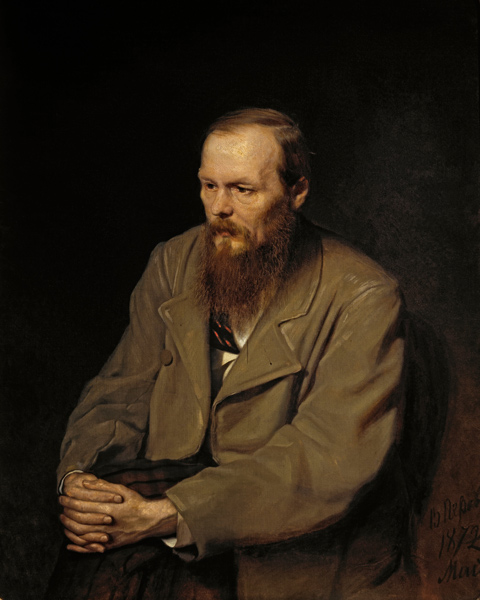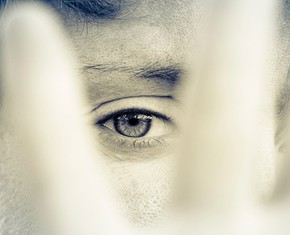The views expressed in our content reflect individual perspectives and do not represent the authoritative views of the Baha'i Faith.
Rushing around in our fast-paced, consumerist, urbanized and technologically-advanced world, have you ever felt your values, your humanity, or even your soul, slipping away?
That dark theme—losing touch with our inner reality—dominates the art and the literature of the post-modern era. Called anomie, angst or apathy, some say it’s directly caused by our complex and morally ambiguous societies, which tend to focus on the material world and ignore the spiritual one.
In Fyodor Dostoyevsky’s great novel The Brothers Karamazov, for example, one character remarks that without belief in God and immortality, everything would be lawful. In a culture with no moral compass, any act, no matter how transgressive, becomes thinkable and doable. We face that ugly reality today.
Only one of the founders of the major world Faiths ever had to confront this condition.
Baha’u’llah, born at the beginning of the industrialized age, gave humanity a new religion that directly addresses the inherent conflicts between faith, ethics and morality; and high-tech, industrialized post-modern societies. With its emphasis on reason, on the agreement of science and religion, and on the independent, rational investigation of truth, the Baha’i Faith definitely encourages the development of a technologically-advanced world. In fact, in 1875 Abdu’l-Baha wrote a book called The Secret of Divine Civilization on the subject, which addressed the scientific, technological and governmental backwardness of Persia at the time—and enthusiastically advised the leaders of that society to follow Europe’s example and modernize:
Did not these new systems and procedures, these progressive enterprises, contribute to the advancement of those countries? Were the people of Europe harmed by the adoption of such measures? Or did they rather by these means reach the highest degree of material development? Is it not true that for centuries, the people of Persia have lived as we see them living today, carrying out the pattern of the past? Have any discernible benefits resulted, has any progress been made? If these things had not been tested by experience, some in whose minds the light of native intelligence is clouded, might idly question them. On the contrary, however, every aspect of these prerequisites to progress have in other countries been time and again put to the test, and their benefits demonstrated so plainly that even the dullest mind can grasp them.
Let us consider this justly and without bias: let us ask ourselves which one of these basic principles and sound, well-established procedures would fail to satisfy our present needs, or would be incompatible with Persia’s best political interests or injurious to the general welfare of her people. Would the extension of education, the development of useful arts and sciences, the promotion of industry and technology, be harmful things? For such endeavor lifts the individual within the mass and raises him out of the depths of ignorance to the highest reaches of knowledge and human excellence. – Abdu’l-Baha, The Secret of Divine Civilization, p. 13.
But even though Abdu’l-Baha saw and approved of some benefits of the modern era and its technologies, he did not have an entirely positive view of its effect on our souls. During his first visit to the modern capitols of Europe in 1911, Abdu’l-Baha once remarked:
I see the people like bees or ants, coming and going by troops, surging past like waves, continually engrossed in their business.
But if you should ask them, ’What are you doing? Why all this commotion?’ You would find that they know nothing at all of their origin or their end, and that they look for no other good except eating and sleeping and assiduously pandering to their sensual desires. – Baha’i World, Volume 13, p. 1187.
When Shakespeare wrote his most famous soliloquoy in the last act of Macbeth, he may have had the same idea in mind:
And all our yesterdays have lighted fools
the way to dusty death. Out, out, brief candle!
Life’s but a walking shadow, a poor player
that struts and frets his hour upon the stage
and then is heard no more. It is a tale
told by an idiot, full of sound and fury
signifying nothing.
Abdu’l-Baha’s criticism of modern society—“they know nothing at all of their origin or their end”—asks us to slow down, stop and contemplate our real purpose in this fleeting plane of existence. It prompts us to consider the big questions: who made us, and why? It points out that each human being contains a greater and much more profound reality than simply our commercial or material existence. It calls upon us all to remember that we have a temporary physical life and an everlasting and timeless spiritual life.
Like Shakespeare and Dostoyevsky and the founders of every great Faith, Abdu’l-Baha urges every man and woman to take the long view, meditate on the meaning of our mortality, and transcend this walking shadow.
You May Also Like
Comments


















“If the edifice of religion shakes and totters, commotion and chaos will ensue and the order of things will be utterly upset, for in the world of mankind there are two safeguards that protect man from wrongdoing. One is the law which punishes ...the criminal; but the law prevents only the manifest crime and not the concealed sin; whereas the ideal safeguard, namely, the religion of God, prevents both the manifest and the concealed crime, trains man, educates morals, compels the adoption of virtues and is the all-inclusive power which guarantees the felicity of the world of mankind.” ‘Abdu’l-Bahá’, Tablet To The Hague.
Baha'i love
Paul